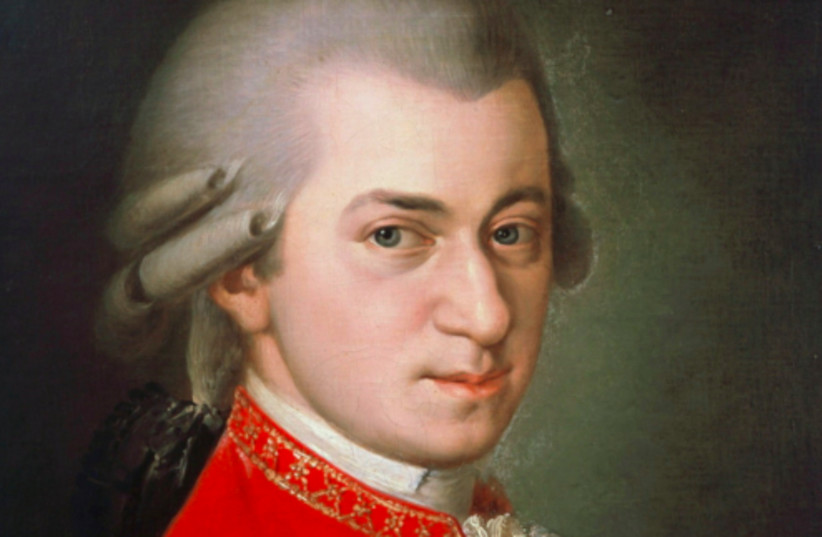Mozart’s Requiem will seal this opera season under director Shirit Lee Weiss and lighting designer Nadav Barnea, with its premiere slated for Tuesday, July 18.
Having already tackled core Hebrew biblical myths in David Zeba’s Mothers last summer, Weiss and Barnea are eager to represent this rich, highly Catholic, Latin text in a blazing new manner.
“There is something liberating about being Jewish, or Israelis, which allows us to study Christian texts in a freer manner,” Weiss says.
“With Mothers, we were working against all we already know, all our preconceptions,” she points out that “Giacomo Puccini, for example, is very Catholic, a culture which is allegedly very distant from us, yet, by virtue of not having an emotional connection to this or that culture, one can view it from a fresh perspective.”
Left unfinished by Mozart’s death in 1791, Requiem was completed by his student Franz Xaver Süssmayr at the request of Mozart’s widow, Constanze, with the help of other composers. The theatrical plotline used by Peter Shaffer’s 1979 play Amadeus, that a mysterious man in a mask commissioned a requiem from Mozart, is grounded in history. Count Franz von Walsegg, an amateur musician who enjoyed passing off purchased work as his own, commissioned it from Mozart to mourn the passing of the count’s wife Anna. Constanze Mozart wanted to deliver the notes as entirely written by her late husband and collect the promised payment in full. The various legends that Shaffer skillfully wove into his play – that Mozart wrote Requiem for himself, knowing his death was near for example; or that he was poisoned by Freemasons after exposing their secret rituals in his 1791 opera The Magic Flute – are emotionally powerful but likely false.

Beseeching God to grant the soul of the departed eternal rest (requiem aeternam), the Latin words form a core text in Western civilization. They contain Hebrew ideas about the Lord residing in Zion, Greek ideas lifted from the Sibylline Oracles (“What shall become of me, miserable one, on that day/ in return for all the things I foolishly busied myself with...?”), and Christian ideas of Christ as a redeemer able to “deliver the souls of all the faithful departed from the pains of hell.”
What makes this performance special?
“There are moments in our Requiem,” Barnea says, “when we are liberated from the specific nature of this music – and light itself becomes the focus of the drama.”
“We come out of light, return from light,” he adds, “at some points, light itself is the field on which the music takes place.”
“This field of light enables us not to be specific [to 1791 Vienna or a somber Church mass],” Barnea points out. It allows entry to “a poetic world in which we may discuss the parting soul.”
As Weiss sees it, this Requiem contains highly stylized artistic explorations of mourning rituals, of what a grieving process feels like, and of the various functions these things fulfill in society.
Barnea says that almost all the patrons who will attend this Requiem are already familiar with the music, which “allows us to create, to deal with this very iconic structure, and see how it works from the inside.”
In its 2017 revival of Shaffer’s Amadeus, the National Theater cast Lucian Msamati as Antonio Salieri and Adam Gillen as Mozart. As per Shaffer’s dramatic engine that placed Salieri as a musician painfully aware that he was no genius whereas Mozart was – and was selected by God himself to express his glory – Salieri is asked by Mozart what he thinks of Requiem.
“Is it good Sir?” Gillen-as-Mozart asks.
“It will help the ages mourn forever,” Msamati-as-Salieri responds.
In this new Israeli production, the stage and floors are black, there are no spotlights. All light rays come out of the objects in tenebris (pitch black) as the performers carry out their mourning rituals with them, Barnea and Weiss point out.
It is a highly condensed obscurum (darkness), a Viennese winter funeral delivered in the heat and light of Zion’s midsummer. A fitting conclusion, I think, to a stunningly good opera season.
Mozart’s Requiem will be performed from Tuesday, July 18, at 7:30 p.m. to Sunday, July 23, at 9 p.m. Latin with Hebrew and English subtitles. NIS 125 to NIS 375 per ticket. Call (03) 692777 for bookings. The Israeli Opera is at 19 Shaul Hamelech St., Tel Aviv. The National Theater production of Shaffer’s Amadeus is available online via The National Theater at Home VOD service (until November of this year) at https://www.ntathome.com/amadeus
